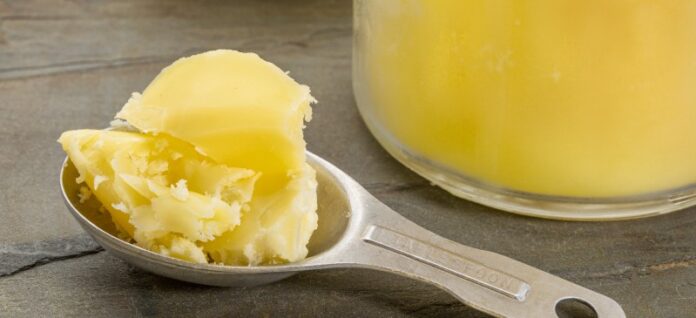Hair is one of the most essential parts of our look. Apart from choosing the right products, our diet and habits also play a key role in maintaining healthy hair. Our hair is often damaged by environmental pollution and dirt, leaving them weak and dull. Thus, they require regular nourishment through oil, ghee, or revitalising serums.
When discussing haircare products, two readily available household names that instantly pop into our minds are coconut oil and ghee. While both contribute towards healthy soft hair, it can be confusing to pick the better option for our hair.
Let us explore how these natural ingredients can transform your hair care routine:
Coconut oil
Coconut oil is an edible oil derived from the kernels, meat and milk of the coconut palm fruit. Coconut oil is 92% saturated fat and contains certain disease-fighting phytochemicals or antioxidants. These antioxidants help improve the quality of skin and hair.
Ghee
Ghee is clarified butter, used as a traditional medicine and in many Indian dishes. The anti-inflammatory and antioxidant-rich qualities of ghee improve skin and hair quality. It gives your skin and hair brightness by acting as a natural moisturiser.
Benefits of Coconut Oil on hair
- Coconut oil’s fatty acids penetrate the hair shaft, helping to restore dry and damaged hair and providing deep moisture.
- Its natural soothing properties help reduce frizz of the dehydrated hair. Hence, it also prevents dry, flaky scalps that result in dandruff.
- The fatty acids in coconut oil help reduce protein loss.
- It protects the scalp from bacteria and other irritants and prevents it from causing more damage.
- Coconut oil can be used as a hair refresher between washes and also to restore nutrients after damage from straightening and other hair treatments.
Benefits of Ghee on hair
- According to a report by Health-e, ghee has many benefits for the hair, including hydration, providing vitamins, eliminating microbial infections and smoothing the hair.
- Ghee’s fatty acids nourish hair roots and scalp, preventing frizz and dryness.
- Ghee provides vitamins A, D, E and K, along with healthy fatty acids, which help promote hair growth and a healthy scalp.
- Massaging ghee into the scalp also improves blood circulation.
How to Use Coconut Oil for Hair Growth
- Warm a small bowl of coconut oil and give a firm massage on the head to provide relief from stress.
- You can apply coconut oil just before washing the hair with shampoo, which helps to condition the hair.
- Mix it with other ingredients like hibiscus, methi (fenugreek) seeds, curry leaves and aloe vera to make a hair mask for shiny black tresses.
How to Use Ghee for Hair Growth
- You can mix a teaspoon of ghee into warm water and drink it on an empty stomach in the morning. This can help cure many body problems, including strengthening hair.
- You can mix ghee with honey or yoghurt and apply it as a mask to nourish your hair with proteins and vitamins.
- Apply ghee and leave it overnight for increased hair smoothness and shine.
- You can mix olive oil with ghee for better conditioning.
But when you need to choose between the two, you can check the below-mentioned factors:
- Saturated fat: Coconut oil has about 90% more saturated fat than ghee, which has only about 50%.
- Scalp sensitivity: If your clap is sensitive, you may choose oil as it is lighter.
- Vitamins and minerals: Ghee has more fat-soluble vitamins and micronutrients than coconut oil, including vitamins A, D and E.
Ghee’s rich, nutrient-dense profile suits thicker, coarser locks, while coconut oil is likely better for a little thin hair as the oil is lighter in weight.
One more thing to remember is that coconut oil or ghee shouldn’t be left in the hair for more than a day as it may attract pollution, making it dirty and heavy.


